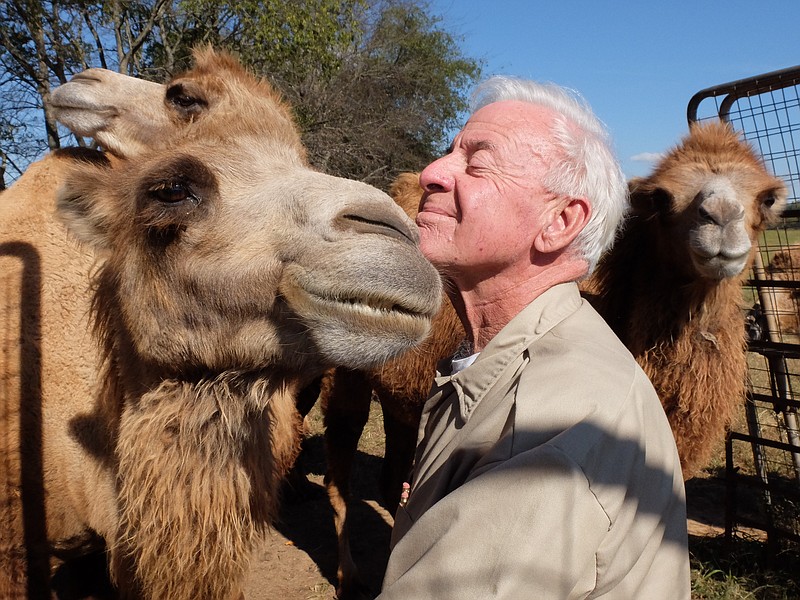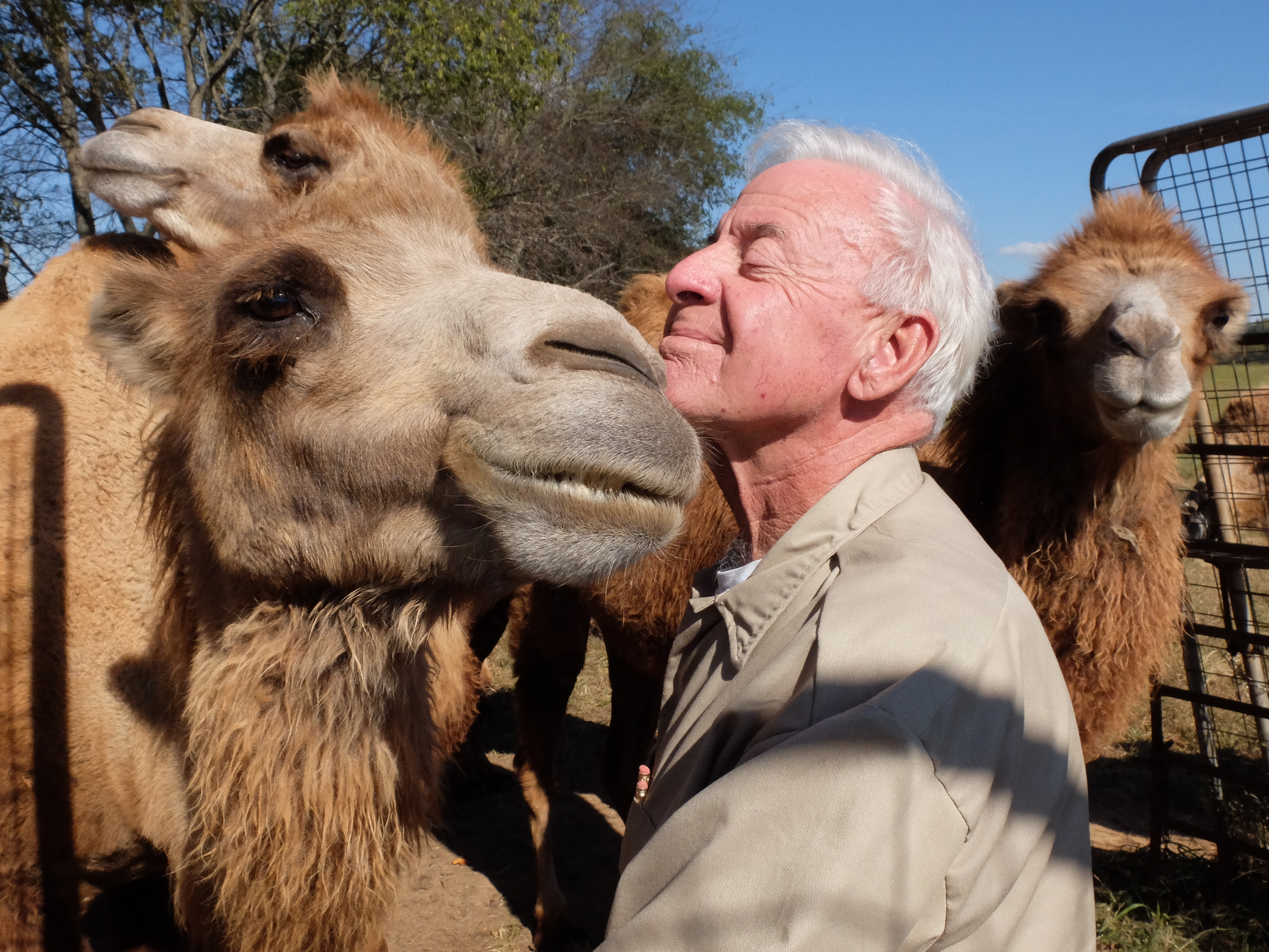BELVIDERE, Tenn. - It's a pastoral, rural Tennessee scene but there's nothing typical about it.
Many of the flourishing plants are unfamiliar, and the exotic animals grazing in the bright October sun have stripes, spots, humps, odd socked hooves and horns as big around as your leg.
For Don Shadow, the idea behind his conservation efforts isn't just to save a few animals and sprouts; it's to save for future generations some of the Earth's rarest species on his vast spread.
It's something of a Noah's Ark - without the water.
Shadow is a fourth-generation nurseryman and the founder of Shadow Nursery in Franklin County. His operation started in 1973 with the purchase of 500 acres of farmland just off U.S. Highway 64 as it dives west off the Southern Cumberland Plateau.
In the four decades that followed, Shadow's idea swelled into a nursery operation aimed at wholesale landscaping customers - and some special customers - who seek sound plants, ornamental trees and shrubs ranging from garden standards to hard-to-find specialties.
Then there's the 300 to 400 wild animals - dozens of species - roaming the property, including a camel herd that could be one of the largest in the U.S. Examples of other animals, like the Somalian wild ass, he says are the only ones of their kind in America.
"I was telling somebody the other day that some people want a boat or plane or motorcycle or a race car or something, and my interest has always been plants and animals," Shadow said.
Thursday morning, Shadow, 75, was telling employees Juventino Martinez and Ricky Bolden which Ruby Slipper ornamental oakleaf hydrangeas to dig up. The 6- to 7-year-old plants were propagated in conjunction with the U.S. National Arboretum and the Tennessee State University Nursery Research Center in McMinnville.
Like many of the plants at Shadow Nursery, the Ruby Slipper and Munchkin hydrangea varieties were the result of research, where a handful of seedlings were selected for propagation.
When it comes to the animals, Mother Nature did most of the development work, but it's up to conservationists to see that the rarer ones are preserved for the future.
Shadow doesn't like to talk about the zoological sources of the animals or which are the rarest. The animals, housed behind 8-foot-high field fences that surround much of Shadow' property, all appear in top condition, and some are friendly as pets. They are the offspring of captive parents from zoos and other sources, he said.
"I'm only interested in the breeding and preservation of the animals," Shadow said.
Neighbors of the operation are treated to a little taste of "Wild Kingdom."
R.E. Bonner, who has lived next door for 10 years, never tires of checking on his unusual neighbors.
"It's interesting just to ride down the road sometimes," he said. "All I see at my end are camels and zebras. They don't act like wild animals. They just come right up to you."
Bonner noted how often he sees Shadow on the move, taking care of the animals.
"He seems like quite the Renaissance man," Bonner said.
Other times, Shadow sounds more like a hog farmer calling his critters to the trough.
"Wheeee-oh! Come on, come on, come on!" Shadow he shouts across a field surrounded by the towering fence.
A herd of 1,000-pound-plus bactrian camels rushing to the opened gate to greet him. Bactrians are the Asian camels with two humps. A bottle-fed female, or mare, nuzzled Shadow's hand and face as the others crowded around looking for snacks and attention. A male camel, called a stallion like a horse, loomed threateningly behind them.
"Never trust a male camel," Shadow warned as the stallion wove through the mares to head off the humans. "They have canine teeth."
In a nearby field, a friendly dromedary camel - the one-humped variety often called the "Arabian" camel - trailed after Shadow's pickup on the other side of the tall fence.
The 25 to 30 species on the farm include 15 kinds of deer, Przewalski's wild horses, "real" longhorn cattle, Sicilian miniature donkeys, Brazilian tapir, South African bush pigs, gayal, capybara, Somalian wild asses, Damara zebra and lots of others, including a number of birds.
Roaming around
Animals on Don Shadow’s property include:› Bactrian and dromedary camels› Przewalski’s wild horses› Brazilian tapir› Capybara› Damara zebra› Sicilian miniature donkeys› Somalian wild ass
"Breeding loan" agreements allow Shadow to take in offspring from zoological sources to use to establish breeding stock on the farm. The offspring of those animals can be released to zoological parks or other animal conservationists, he said.
An ancient flip-phone chimes from between the front seats of Shadow's Nissan pickup truck - a battered, gray four-wheel-drive with more than a quarter million miles on it.
"Shadow Nursery," he answers fast and loud each time. The phone seems to ring about every five minutes.
One call was about some people who had picked a batch of dogwood tree seeds and wanted to sell them; others were about plant cuttings, and two men, Nashvillian Jack Torkelson and Mark Vance from Woodbury, wanted to talk to the expert about American smoke trees that grow in the more alkaline areas of Franklin County's lower mountainsides.
Shadow is a well-known resource.
One fellow conservationist calls Shadow his inspiration and says it's possible Shadow has preserved some of the world's most endangered species over his lifetime.
Jon Conley operates Tennessee Safari Park in Alamo, Tenn., a drive-through wild animal park about 20 miles northwest of Jackson.
"There are numerous species that he has that are the only ones in captivity," Conley said. "And there are so many plants that he has been able to find, name and propagate and then give them to everybody."
It's Shadow's selflessness that marks him.
"A lot of 'plants people' will patent one of these rare and unusual plants, and I've always liked it about Don that he propagates plants but he never patents them," Conley said.
"Money isn't his main interest, he's a true innovator," he said. Conley said a variety of sweetgum tree called Slender Silhouette is a columnlike tree species from Franklin County that now thrives in landscaping projects worldwide thanks to Shadow's work.
"Don has an eye for the rare and unusual and he has the means to perpetuate it, keep it and conserve it. A lot of people can appreciate it, but they don't have the means to conserve," he said.
The rarest single creature on the farm might be Shadow himself.
"It's hard to describe him unless you know him," Conley said. "He's truly one in a billion."
Contact staff writer Ben Benton at bbenton@timesfreepress.com or twitter.com/BenBenton or www.facebook.com/ben.benton1 or 423-757-6569.


